He bent low. His back ached. He could smell the earth below his face, the stinking, ever-present mud. Mercifully, free of gas. For now.
The soft lip of the trench – or, what had been a trench before German artillery had blasted it to ever-living hell – was a dim reflection in the early morning light. His ears still rang and jangled from the deafening explosions that had rocked his small dugout, as he and his friends had crouched down, trying their best to become one with the earth, metallic hell unfolding around them. It now appeared the German barrage had lifted, or at least moved somewhere else to spread its death and slaughter.
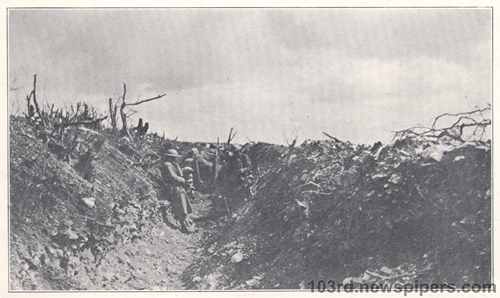
Glancing outside his hole in the earth, he caught glimpses of what had once been buildings before the war had turned them into broken husks, their outlines barely visible through the haze. Beyond the ruins of the town of Xivray, he could sense the hill of Mont Sec, though he could not see it. From its heights, the Germans could watch every move the Americans made. He half wondered if they could see him now.
As his hearing cleared, he could hear the shouts and screams from the communications trench, indicating that some had not been so lucky through the barrage. Further back, the sharp crack of American 75mm artillery pieces could be heard, followed by the whizzzzzz of the shell’s trajectory, and then finally a dull thump as it impacted into the French mud of the German trenches across the valley. His hearing fully returned with a rush, as if he was coming out of a tunnel, timed perfectly with an outgoing heavy shell that seemed to rip the gloom in half as it traveled over to pay a visit to the Germans.
He stood now, resting the barrel of his heavy Chauchat automatic rifle on the lip of the trench. It slipped off, another victim of the slick mud that he had come to hate as much as the Germans. He breathed deeply of the cordite-filled air. Yes, he was still alive.
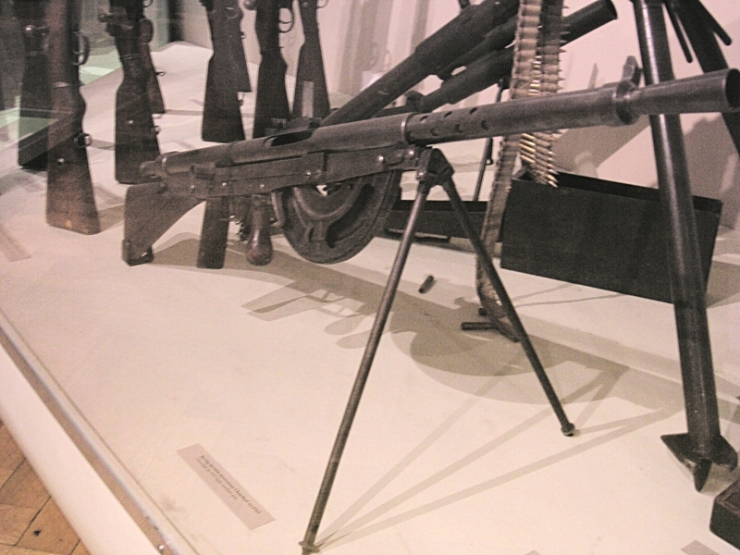
His buddies began piling dirt, rocks, wooden planks, anything, back onto the top of the trench, the sounds of rock striking rock echoing strangely in their little dugout. One man wrapped his darkly dampening leg with a makeshift bandage, too filled with adrenaline to feel any pain yet. Already, through the lingering fog, they could hear the rustling, jangling, and thumping of what they knew would be a German column. The Boche didn’t lay down a barrage like that just for any old day.
He knew how it worked. First would be the pioneers, to blow through the remaining wire with explosives, and then engulf you in fire with their hideous flamethrowers. Then came the Sturmtruppen, those well-trained bastards, seemingly rising from the earth itself, tossing grenades and insults at you, together. These would be followed by more be-pickelhaubed Germans, with machine guns, to cut you to ribbons. Yes, he knew the plan.
Gradually the dull staccato rhythm of machine guns began, rolling from left to right along the line. D Company had survived the barrage, it seemed. He smiled. It was the War Machine come to life, slowly, almost listlessly, tossing over for a moment as if considering a continued repose, and then growing into a crescendo, as the gunners cleared their Hotchkiss machine guns for action, their assistants unpacking glistening lines of ammunition, bent like acolytes at the alter. The American guns sounded like freight trains, he thought, their cyclic crescendo reminiscent of the rapidly clacking gears and pistons he used to hear back home.
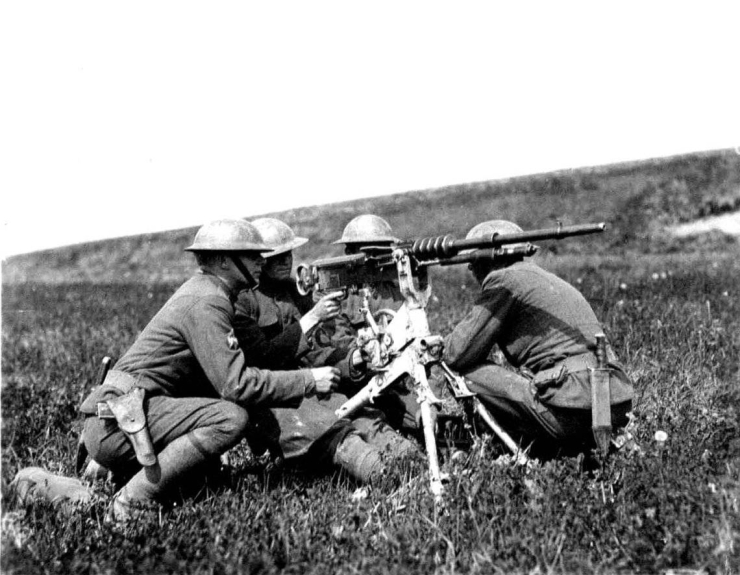
From out in front, an entirely different sound arose. A furiously angry noise, as if a garment with metallic hems was being torn apart: the strident fury of the German Maschinengewehr 08, or as they called it, that rotten Maxim gun. All the men in the muddy hole instinctively ducked, an unconscious genuflection to the terror wrought by that particular German weapon.
He looked up at the sky. The sun was barely risen; or had it risen at all? The gloom of smoke had mixed with the fog rising off the nearby ponds, making a drab canvas. Here and there a Very light broke the gloom to cast the earth below into detail. Nearby, a Hotchkiss sputtered into action, and he could glimpse the flashes of the muzzle as the gun traversed towards the enemy, towards his own immediate front.
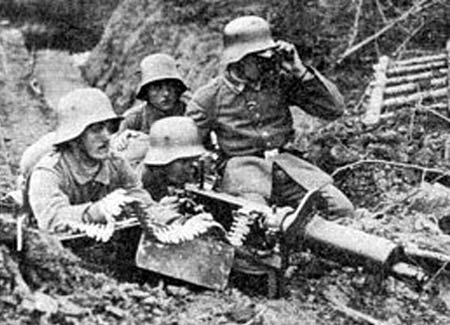
“Front, Boche are in the wire!” came the call from some unknown throat, perhaps his own, who really knew. The line of tin hats clattered on the trench lip, rifles scraping the escarpment, each man peering up to try to catch a glimpse, to try to get that momentary edge on the enemy. He scrambled up too, boots slipping in the mire, Chauchat sliding in the mud. He cursed, loudly. It seemed fitting to toss obscenities out into the lead-filled air.
“I can’t see shit,” echoed one of his buddies. Rifle shots cracked out as the Yanks fired blindly into the shifting mists.
The crescendo of war grew louder, on all sides now, echoing back and forth inside the sodden trench.
He cursed again, and, yanking the heavy Chauchat up into his arms, shoved his foot into a toehold in the trench wall, grabbed at a root, and lifted himself up over the parapet; a giant silhouette of a man against the sky.
From there it was as if another world had formed around him. He was in the open, there was movement in the air. And more importantly, movement below. Down the slope, he saw the Germans, shifting in the fog, more like imagined ghosts than real people. There were eight or ten of them already through the break in the last wire.
He hefted the Chauchat to his shoulder, grabbing at his bag of extra clips at the same time, feeling the satisfactory weight of the bag. Planting his feet firmly in the mud, he drew down on the closest shapes. Yes, that is what they were. Shapes. He squeezed the trigger. And again. And again. The rifle barked, kicking him savagely in the shoulder, but he bore down on it, willing it to his use.
The deadly accurate volley of fire shocked the oncoming Sturmtruppen, stopping them short, many forever, the 8mm slugs tossing them backwards into the never-ending coils of wire. Germans dove for what cover they could, scrambling to get a shot off at the raging monster that had emerged from the living earth, spewing fire.
His comrades, no less shocked than the Germans, stared at him, watched as he furiously reloaded a seemingly endless supply of the curved twenty-round ammunition magazines, and continued his gruesome task.
“Gimme more ammo!” he shouted down to them, his voice blending with the last bark of the rifle, as he reached one hand back to receive more ammunition that was wordlessly passed to him. This roused his mates to action, and, splashing through the mud, they crawled atop of the trench lip, tossing grenades, and firing off a deafening fusillade of rifle shots.
Nearby, a Hotchkiss that had been silenced by the loss of its tenders came under new ownership, as Doughboys heaved the bodies away, cleared the gun, and it resumed its reverberating chatter. Caught between two fires, the German column dithered, writhing left, now right, before slithering rearward, losing tentacles to shellfire as U.S. artillery voiced its displeasure, its wake marked by drooping, ghastly shapes, hung in the wire, like ghoulish ornaments.
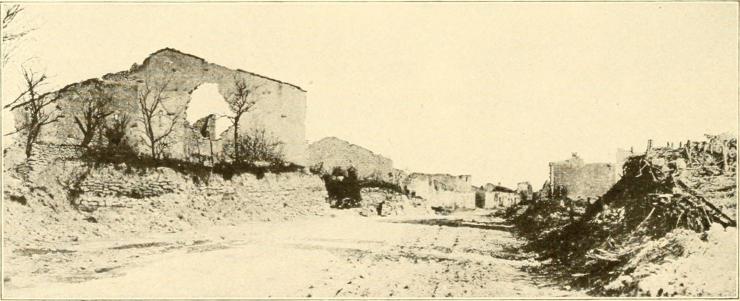
He dropped back into the trench, hands still holding his rifle tightly, feeling the smoothness of the wooden foregrip. His friends stared at him, as if he was some kind of specter. Outside their small, muddy hole, the war raged on. They could hear the rush and stamp of feet nearby as the reserve platoon charged past, mud flying through the air, spattering their faces. A sharp and furious whoosh indicated that a German flamethrower’s tank had been hit, and its bearer reduced to a horrific bonfire. Machine guns and artillery now formed a symphony of hate, chasing the Germans back into their own wire, while the crump crump crump from the rear heralded a new German bombardment.
He rested his back against the trench wall, sliding down into a crouching position, rifle balanced on his knees, as he slowly withdrew a battered cigarette from his breast pocket. His smudged face turned to his friends, and, earnestly looking them in the eyes, he asked:
“Got a light?”
Around them, the shells began to fall again, like drops of rain.
This episode is based on the true story of Amedee Deschaines, a private in Company I, 103rd U.S. Infantry Regiment in World War I. From Nashua, New Hampshire, Deschaines was noted to be a very strong man, which is why he was given the Chauchat automatic rifle to carry. On June 16, 1918, approximately 500-600 Germans in three columns attacked the barely 200 members of the 103rd Infantry who were holding the front lines around the towns of Xivray and Marvoisin. There were many heroic stories that day, as U.S. machine gunners sacrificed themselves by sticking to their guns to delay the German columns; but none as remarkable as Deschaines’, who somehow managed to come off unscathed after exposing himself to enemy fire for so long. His actions did blunt the enemy attack, and for this he was awarded the Croix de Guerre on November 9, 1918 – just over a month after he had died from exposure to poison gas. His commander remarked that his actions were “of the highest order.” A park in his hometown of Nashua bears his name.
Enjoy what you just read? Please share on social media or email, using the buttons below.




Is this from a book? Love the narrative. VERY good.
LikeLiked by 1 person
There is, as of now, no book on the actions at Xivray on June 16, 1918. The histories of the 26th “Yankee” Division, mostly published in 1919, have some accounts of the fight.
LikeLike
Thank you.
LikeLike